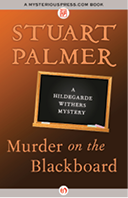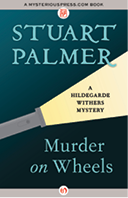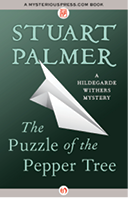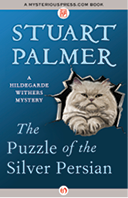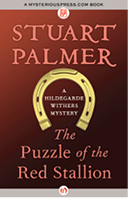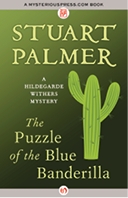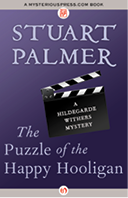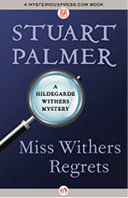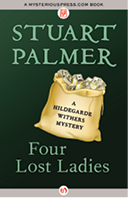Murder on Wheels (30 page)
Authors: Stuart Palmer

“I can take shorthand,” she offered, eager to assist. But Chief of Police Britt held out his hands for the book and pencil.
“Thank yuh,” he said. Then he began a studious enumeration of the dead man’s chattels.
He wrote:
Blk leather billfold, no calling cards, contents fifty-five dollars in fives and tens, parking ticket Terminal Garage, receipt for plane ticket, two newspaper clippings, one eight-cent airmail stamp.
Two letters addressed R. Roswell, Hotel Senator, Los Angeles, unopened. Postmark New York City. One smelly pink paper, the other letterhead legal firm Fishbein, O’Hara, & Fishbein, Park Place, Manhattan.
Change—twenty-dollar gold piece, Canadian quarter, dollar fifty in silver.
Pair of red dice [the chief rattled these thoughtfully as he wrote], fountain pen with initials R.T.F., expensive make, brown silk handkerchief in breast pocket, unmarked. Key ring with two Yale keys and folding corkscrew.
“That seems to be the story,” finished the chief. “Name’s Roswell. Lives over to the Senator in Los Angeles.”
“If his name is Roswell,” pointed out Miss Withers, who was leaning over his shoulder, “then why the initials on his fountain pen?”
The chief of police stared solemnly at the initials R.T.F. “Cuts no ice,” he decided, after ponderous thought. “Prob’ly borrowed it off somebody. Never manage to keep one of the things myself.”
From the hip pocket of his dingy white linen suit, Britt removed a large blue bandanna handkerchief, in which he dumped the articles which he had listed. Then he tied the corners together.
“Got to notify his hotel,” he announced. “Doc, you make out a certificate of death and send it t’ my office so it can go in to the mainland with the corpse tonight.”
O’Rourke had donned a bathrobe, and he looked up from his slippers in surprise. “Where d’you think I’ll get a death certificate? Nobody died here in two years.”
“Make one up out o’ your own head, then,” pronounced the chief. At that moment a hollow siren outside made the windowpanes rattle like castanets. “There’s the
Avalon
now—I got to get back and open up the store—”
“Wait,” demanded Hildegarde Withers. “There’s more to it than that. This man Roswell—or whatever his name is—died suddenly under mysterious circumstances. It isn’t exactly any of my business—”
“Hear, hear,” offered Dr. O’Rourke.
“But all the same, it is my honest opinion that this is a case for a coroner.”
Chief Britt smiled, sleepily. “We ain’t got a coroner, ma’am. When there’s any need we use the one over to Long Beach, on the mainland. I’ll send the corpse over to him and if he wants to, he can have an inquest.”
“And by that time it will be everlastingly too late!”
Miss Withers was intense. “All the people who were on that plane when this man died will be scattered.”
“Yes, ma’am, but—”
“But nothing! Hasn’t this town got a mayor or anything besides you?”
“Yes, ma’am. There’s Mayor Peters, and we got a city manager, too, name of Klein. Both of ’em out in Klein’s boat after sea bass and won’t be back for a couple of days anyway.”
Britt stowed his blue bundle away in a pocket of his coat. He began to show that he was impatient to wind up the matter.
“Now listen,” he approached Miss Withers. “You keep saying you think this fellow was killed. Do you see any reason why you think so?”
“She doesn’t see reasons—she smells ’em,” offered Dr. O’Rourke.
Miss Withers sniffed. “Chief Britt, haven’t you ever had a flash of intuition—a premonition—a
hunch,
in other words?”
The chief blinked his tiny, cunning eyes at her. “Yes, ma’am. In poker games. And it costs me money every time.”
The crowd which lingered outside the little infirmary was increasing steadily, and Miss Withers noticed an admixture of newcomers with suitcases and light coats swung over their arms, as the chief opened the door again.
“G’bye, ma’am, g’bye, Doc,” he spoke politely. Then he stopped short and said, “Hello.”
Through the open doorway a shaft of noon sunshine poured into the dark little room, spreading a track of gold across the floor and touching the bared face of the dead man with a semblance of life.
Then the shaft of sunlight was blotted out again, blocked by the square shoulders of a man so tall that he had to stoop in order to enter the doorway.
His face, Miss Withers instantly noted, was handsome, almost too handsome, in a soft way. The eyes were the only jarring feature, for they showed momentarily a flickering, evasive look. Then he smiled apologetically, and the eyes were like other eyes.
“Excuse me,” he said. His voice had an Eastern tang that was almost harsh among these drawling Californians. “They were saying on the pier that somebody had died, but they didn’t know who it was. I expected a friend to meet me here, and he didn’t show up. I wondered—”
“Take a look for yourself,” said the chief hospitably. “Letters in his pocket identify him as being named R. Roswell. Know him?”
The newcomer removed his Panama and moved toward the body. Immediately he became ten years older than his oddly young face, for his hair was streaked with gray. As yet he had no eyes for the doctor or the two women, but stared at the figure which lay on the operating table as if he expected it to rise and salute him.
For a long minute he stared at the face of the dead man. Then he turned toward the others, his handsome face expressionless.
“I was afraid of that,” he said slowly. “It’s my friend—and his full name is Roswell T. Forrest.”
Miss Withers gasped, audibly. The newcomer turned toward her. “I see you know,” he said. “I was his traveling companion—my name is Barney Kelsey.” Then he continued, dully: “We were supposed to make this little outing together, but Forrest missed the boat.”
“But the letters,” protested the chief. “The letters were addressed to him by his first name only?”
“I’ll explain all that. But, first, do you know who—what happened to him?”
Dr. O’Rourke started to speak, but Miss Withers, in a voice that kept him silent, interrupted.
“A paralytic stroke is a terrible thing,” she observed, commiseratingly.
The newcomer’s eyes flickered once as the chief and the doctor stared at each other blankly.
But before they spoke, Barney Kelsey nodded his head.
“Forrest has had trouble like that before,” he went on, swiftly. “The doctors warned him that another attack would be fatal.”
There was a dead silence.
“Oddly enough,” continued Miss Hildegarde Withers, “Dr. O’Rourke here discovered no trace of paralysis past or present in the body. My remark was purely general. The doctor leans toward heart failure, at the present moment. My own ideas lead in quite another direction. I suppose your friend Forrest was
also
subject to heart trouble?”
Kelsey’s eyes were those of a trapped animal for a flash, and then they became bland and open.
“On second thought,” he said softly, “I agree with you that Roswell Forrest was murdered.”
“I thought you would,” said Miss Withers.
All rights reserved under International and Pan-American Copyright Conventions. By payment of the required fees, you have been granted the non-exclusive, non-transferable right to access and read the text of this ebook onscreen. No part of this text may be reproduced, transmitted, downloaded, decompiled, reverse engineered, or stored in or introduced into any information storage and retrieval system, in any form or by any means, whether electronic or mechanical, now known or hereinafter invented, without the express written permission of the publisher.
This is a work of fiction. Names, characters, places, and incidents either are the product of the author’s imagination or are used fictitiously. Any resemblance to actual persons, living or dead, businesses, companies, events, or locales is entirely coincidental.
Copyright © 1932 by Bretano’s, Inc.
Cover design by Mimi Bark
978-1-4804-1882-0
This 2013 edition distributed by MysteriousPress.com/Open Road Integrated Media
345 Hudson Street
New York, NY 10014



